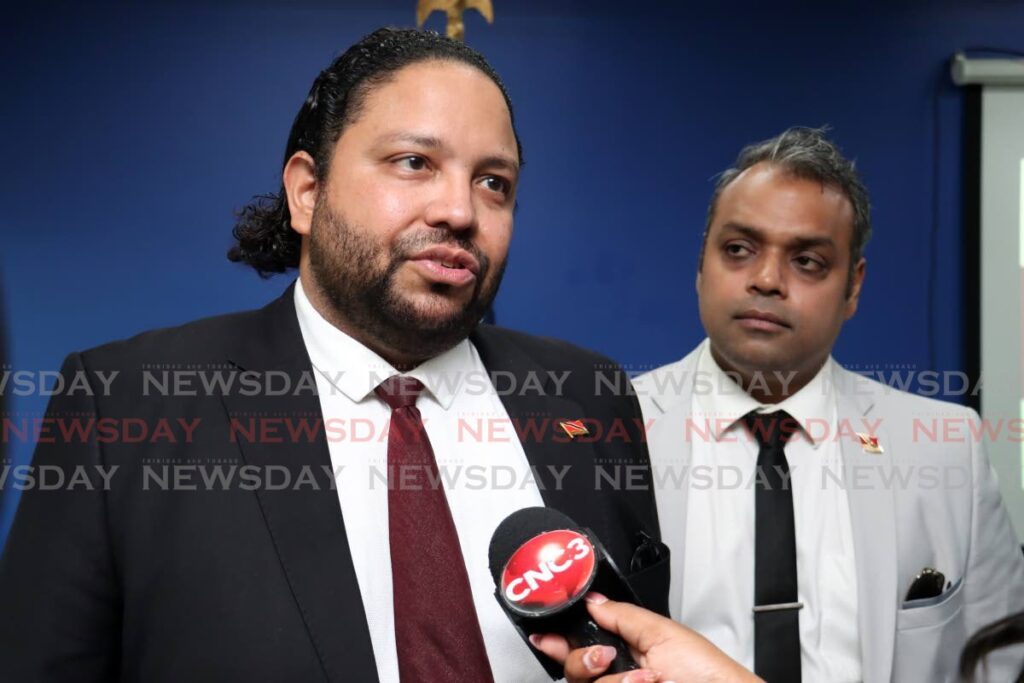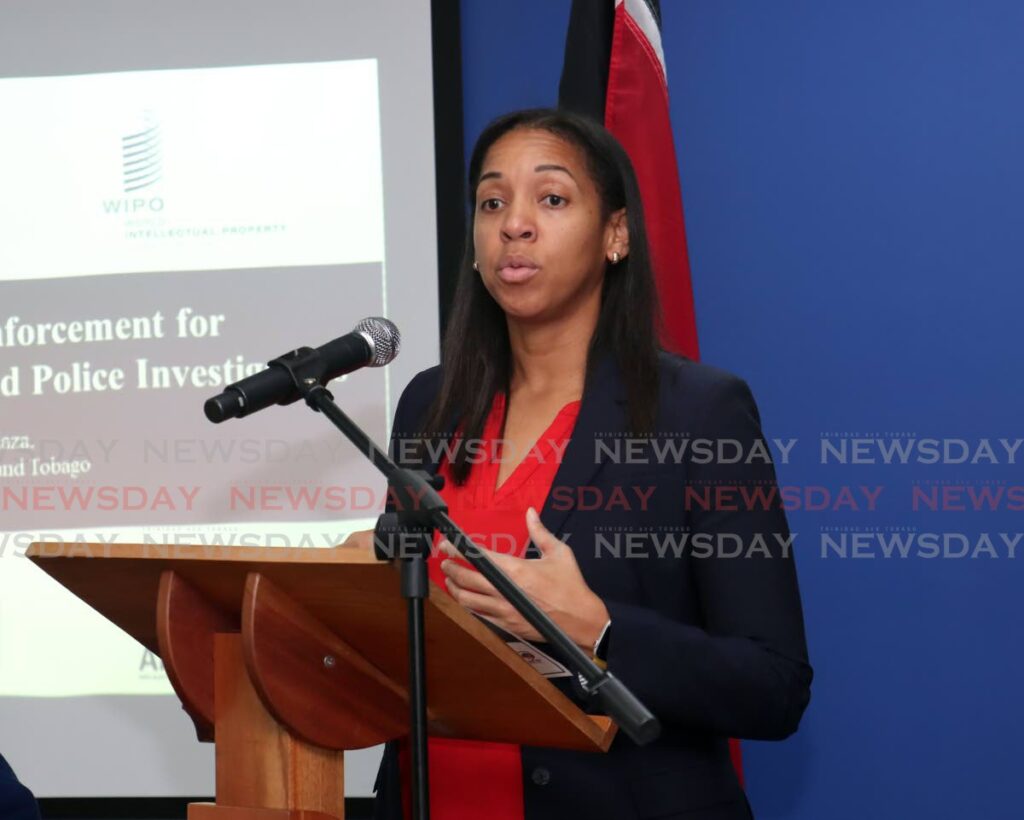Task force tackles illicit goods, piracy, counterfeiting

THE fight against illicit trade in goods, counterfeiting and piracy requires collaboration between agencies locally, internationally and internationally. The sub-regional seminar on enforcement of IP prosecutors, customs officers and police investigators on October 28 and 29 is an initiative by TT’s Anti-Illicit Trade Task Force (AITTF) to bring agencies together to share knowledge and work on best practices.
Illicit Trade
AITTF secretary Aurelia Bruce said the taskforce was made up of 12 organisations, including the TT Intellectual Property Office (TTIPO), the Chemistry, Food and Drugs Division of the Health Ministry, the Financial Intelligence Unit, Customs and Excise Department, Ministry of Agriculture, Land and Fisheries, the police service, Crimestoppers TT, the Bureau of Standards, the TT Manufacturers Association, the TT Chamber of Industry and Commerce, and the Ministry of Trade and Industry.
She said an increase in illicit trade during the covid19 pandemic, especially in tobacco and alcohol resulted in an almost $90 million loss to TT.
“Illicit trade undermines trade and decreases revenue and foreign direct investment. It can result in a loss of brand integrity not only for the original manufacturers, but also for TT if we are seen to be lax about enforcement.
“Illicit trade can also cause job displacement and business closures. It poses health risks from substandard products.”
Bruce said TT's National Action Plan to Combat Illicit Trade in Consumer Goods has 26 measures grouped under five objectives, which are: strengthening the legal framework to combat illicit trade; strengthening the capacity of ministries and enforcement agencies to combat illicit trade; enhancing collaboration among regulatory and enforcement agencies; promoting public-private partnerships towards fighting illicit trade; and increasing public awareness of illicit trade and the associated dangers.
She said there were six working groups, four of which focused on illicit trade in tobacco, alcohol, cleaning agents, and pharmaceuticals, while the others worked on legislation and penalties.
Trade and Industry Ministry acting permanent secretary Randall Karim said the taskforce played an important part of the battle against illicit trade. He said without enforcement, the work of the taskforce would be sterile and useless.
He said the Customs Recordation and Information System (CRIS) being developed by WIPO through the Industrial Property Administration System aims to capture information about brand owners, authorised distributors, authorised manufacturers and provide images of genuine goods. The system should be available to TT in 2025.
Customs and Excise deputy director general Riad Juman said the challenges of intellectual property enforcement have grown more complex in the increasing globalised world.
“The rapid movement of goods and services and ideas across borders has heightened the need for effective strategies. Collaboration is crucial locally, regionally and internationally. By sharing intelligence and best practices, we can strengthen our collective efforts and enhance our ability to combat intellectual property infringements.
“Imagine if you were to spend your money to buy a name-brand perfume or high-end alcohol and then to realise your hard-earned cash went behind a knockoff. It’s about protecting members of the public and the benefits redound to the artists of our nation.”
Asgarali said illegal trade in pharmaceuticals had not yet overwhelmed TT’s sector, although there were people bringing some in in suitcases.
“There are mechanisms in place through the Health Ministry and there are registration systems. The important thing is everyone is working together to look at stopping any possibility of illicit trade, pharmaceuticals, trade, clothing, etc., coming into the border and that is why Customs and Excise is at the forefront of this and the trademark rules that gives customs that ability to seize items and notices, which have been tested in the court and the jurisprudence continues to develop.
“I don’t think the country is overwhelmed with illicit trade, but there are certain items like alcohol, tobacco, cleaning agents that the Anti-Illicit Trade Task Force is looking at, and we expand it as we go along based on the experience that is out there.”
US Patent and Trademark Office enforcement team attorney advisor Charisma Hampton said illicit trade affects a country’s economic diversification, domestic capital and export growth. She said some examples of goods which could be counterfeited included agricultural chemicals, auto sporting goods and equipment, chargers and batteries, may not have all the electrical components inside, pharmaceuticals, food, adulterated liquor, streaming devices, set-top boxes, can expose yourself to identity theft and piracy.
She said illicit trade meant that people were not paying taxes, jobs were not created, and countries lost revenue. She said this led to a loss of innovation as people did not want to make things for fear they would be stolen
“Anything that can be made money on can be infringed on by others”
Hampton said people could purchase goods which turned out to be counterfeit through fake websites, Facebook Marketplace and other social media websites, and e-commerce websites. She said it is hard for customs to monitor small packages due to the volume which were shipped worldwide as people wanted delivery same day or within a few days.
Hampton said some of the strategies to combat counterfeiting and piracy include consumer awareness and education, legislative improvements, better cooperation with the private sector, information sharing within government agencies, allocation of appropriate resources to the fight and enforcement.
An audience member noted that people expected Amazon and other large retailers to do due diligence on the sellers listed on their websites. They noted that often consumers could not be prosecuted for counterfeit items as they were unaware that what they purchased was illicit.
Another audience member suggested that in addition to working on the importation of illicit goods, the taskforce should ensure that fake goods resembling those made in TT are not present abroad.
Intellectual Property
Asagarali said his focus was on getting people to respect IP through education especially in schools.
“I am more concerned about the youth, respecting our artists, young and old and showing the importance of the profession that is the creative industries. For too long, some people see it as a side hustle but we in government are doing our part to really show that this is the future.
“It’s not only about oil and gas, but the wealth of our people, the wealth of the mind, how we can harness that, how we can develop strategies to respect it, how we can push our creative industries in a uniform way for our people to benefit.
With respect to digital piracy, Asgarali said the TTIPO had been working with other agencies to combat the” lure of the free.
“ We’ve written to several agencies over the years and asked them to license the country so there’s more opportunity and availability of content. He said this is how people were able to access Disney Plus, Amazon Music and Movies and Spotify.
“Spotify realised we had important people here, and we are the land of reggae and soca. But you have to license and provide the opportunities for our population, once educated, through the public education programmes, to make the switch. Once upon a time MovieTowne had a million people coming through the turnstiles. So once you have that choice, we respect IP.
“Having it in the syllabus is critical because the youth now see the importance of listening to music on Spotify, watching a Netflix programme and looking at our local programmes on TTT. We want people to respect our IP.”


Comments
"Task force tackles illicit goods, piracy, counterfeiting"